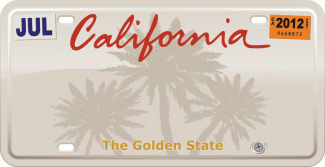Proposed California bill would restrict license-plate scanning

Image from Shutterstock.
Citing privacy concerns, proposed legislation in California would restrict the state’s use of license-plate scanning technology.
California state senator Jerry Hill is pushing a bill that would rein in law enforcement’s growing reliance on the technology, the Los Angeles Times reported. According to the Times, police utilize high-resolution digital cameras that are mounted on cars and street poles to take pictures of license plates. The cameras are connected to a massive database, which can keep track of every place a particular vehicle has been recorded.
While Hill conceded that there are legitimate law enforcement concerns for such a system, he maintained that the state has overstepped its boundaries. “What they’re doing crosses the line,” Hill said to the Times. “It’s an important tool for law enforcement, but we need to be extremely vigilant to protect our right to privacy and the civil liberties we cherish.” His bill would ban public agencies from sharing their data with private organizations, prohibit license plate scanners from coming onto private property without consent, and make it easier for people sue data collectors.
Hill’s proposed bill could be in for rough going. A similar bill died in 2012 after law enforcement and license-data collectors put up a ferocious fight. According to the Times, the Los Angeles County Sheriff’s department has 84 vehicles with plate readers, as well as 47 more in fixed locations. The Los Angeles Police Department, meanwhile, has 240 car-mounted readers and 30 fixed ones. That number does not include privately operated cameras.
One of the largest scanning firms, Livermore, California-based Vigilant Solutions, cites the First Amendment and argues it is entitled to take pictures in public. According to the Times, Vigilant’s free speech lawsuit against Utah scuttled a proposal by the state to ban license plate scanners. Vigilant has more than 3,500 law enforcement clients and provides clients with access to more than 2 billion scans maintained by its affiliate, Digital Recognition Network. The Times reports that Vigilant recently offered police in Tempe, Ariz., free license plate scanners. However, the offer was contingent on police using the scanners to execute 25 “Vigilant warrants” per month—warrants provided by private collections agencies of people who fail to pay municipal fines.



